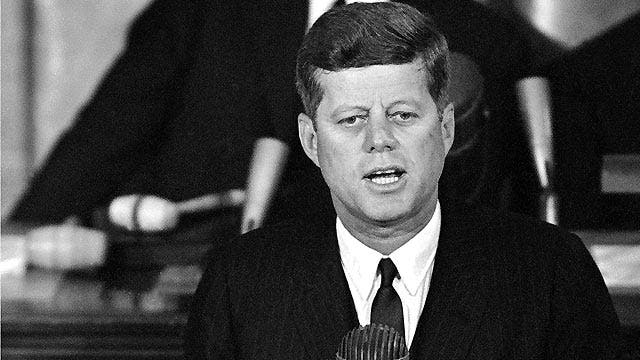Ronald Reagan knew that there was always one reliable way to annoy liberals: When advocating for one of his conservative policies, he’d invoke the name of John F. Kennedy.
For his 1980 campaign against Jimmy Carter, Reagan made a television commercial in which he praised JFK’s broad tax cuts 20 years earlier, saying, “when he cut taxes everyone gained from an expanding, fully employed economy … If I’m elected, we’ll do it again.”
A broad swath of Democrats crossed party lines and contributed to Reagan’s victory that year (and thus were born "Reagan Democrats"), and in his re-election effort four years later, Reagan cited JFK 51 times on the campaign trail. The JFK references so irritated Kennedy’s brother, Sen. Edward M. Kennedy (by then, the “Liberal Lion” of the Senate), that the younger Kennedy peevishly declared, “Ronald Wilson Reagan has no right to quote John Fitzgerald Kennedy!”
But Reagan’s purpose wasn’t just to provoke liberal ire. On the big issues, such as tax policy and America’s place in the world, Reagan really did locate himself on a political spectrum right next to JFK.
“[Kennedy] was a religious man, and he saw the Soviet Union as this godless, really evil empire,” says Ira Stoll, author of “JFK: Conservative.” “He used the word ‘evil,’ just like Reagan did … That's the case for Kennedy as a conservative right there.”
Liberal criticism of Stoll’s Kennedy-as-conservative thesis has been unsparing. “Loony,” is how the New Yorker termed it. “Ridiculous,” was The Economist’s assessment, and Salon called it the “Right’s favorite new lie.”
Former Kennedy Justice Department lawyer, and close aide to Robert Kennedy, Adam Walinsky, says that what Stoll and other conservatives ignore a key development late in Kennedy’s life. While JFK may have campaigned as a conservative Democrat in 1960, they say, and while he may even have governed as tough Cold Warrior and tax-cutter, Kennedy was moving to his left in the days and weeks just before his assassination 50 years ago this month.
“He’s the guy who decides at the very end of the life that he was allowed to have, that he's made a fundamental error about the way that the United States should deal with the rest of the world,” Walinsky says. He cites as evidence a speech that Kennedy gave at American University in June 1963.
"If we cannot end now our differences, at least we can help make the world safe for diversity,” Kennedy said in that commencement address. “For in the final analysis, our most basic common link is that we all inhabit this small planet. We all breathe the same air. We all cherish our children's futures. And we are all mortal."
In the liberal claim to the JFK legacy, that speech is offered as Exhibit A.
“It was the first great fundamental spiritual turn away from the whole idea of the Cold War,” Walinsky says.
Jeff Greenfield, author of a new alternative history called “If Kennedy Lived,” also cites that AU commencement speech, and concludes that, among other things, JFK would never have escalated the Vietnam War had he lived.
“It's the start, I think of an effort by Kennedy to begin to reframe the way Americans think about the world,” Greenfield says of that speech. “It's not just us against them, and one of us is gonna win.
Stoll insists that such analysis is “just wishful thinking” on the part of liberals who wish to forget JFK’s strident anti-communism and proto-supply-side impulses.
Stoll notes that, just a few weeks after that dovish-seeming AU speech, Kennedy went to Berlin, and delivered one of the most memorable speeches of his life.
“There are some who say that communism is the wave of the future,” Kennedy said that day. “Let them come to Berlin.”
That rhetorical challenge foreshadowed the words delivered by Ronald Reagan at Berlin’s Brandenburg Gate a quarter-century later: “Mr. Gorbachev, open this gate … Mr. Gorbachev, tear down this wall!”
Reagan once noted, with a laugh, that his references to JFK made Democrats want to “start tearing their hair out.”
Fifty years later, it still does.













































